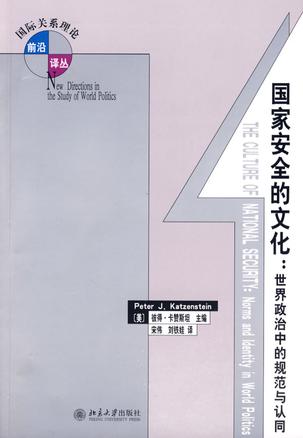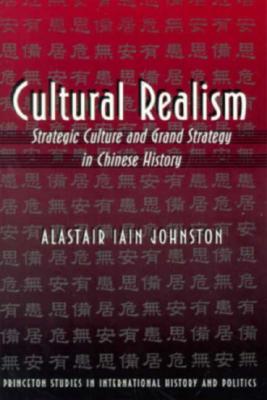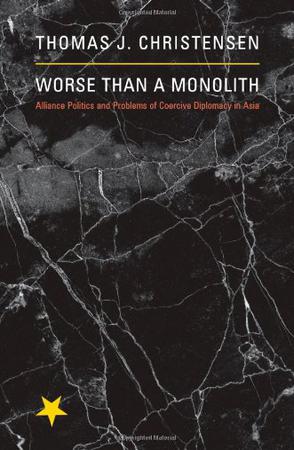-

国家安全的文化
《国家安全的文化:世界政治中的规范与认同》集中探讨的是规范、认同和文化在国际国内安全中的影响问题,将建构主义的基本观点第一次全面地运用于实证领域。它涉及到了从19世纪20年代的希腊独立运动到今天的巴以谈判这样漫长的历史,思考了从核武器和化学武器使用禁令到人道主义干涉这样迫切的国际问题。《国家安全的文化:世界政治中的规范与认同》的问世代表着美国学术界一场知识运动的高峰,奠定了国家安全和全球事务研究的新框架,宣告建构主义已经发展成为一种独立于现实主义和理性主义的理论分析方法。著名的社会建构主义学者泰德·霍普夫(Ted Hopf)盛赞它是“把建构主义和安全研究结合起来的第一次尝试之作”、“必将成为国际关系理论的一部新的经典”。直到今天,我们仍然很难看到有另外一本著作能如此全面、深刻地探讨社会建构主义;可以想见,它以前是、现在是、将来也还会是那些想深入了解建构主义国际关系理论的读者的案头必备之作。《国家安全的文化》由著名的美国国际关系理论家彼得·卡赞斯坦教授主编,汇集了包括亚历山大·温特、玛莎·费丽莫、伊丽莎白·基尔、江忆恩等在内十六位美国一流学者的学术论文。 -

Cultural Realism
Cultural Realism is an in-depth study of premodern Chinese strategic thought that has important implications for contemporary international relations theory. In applying a Western theoretical debate to China, Iain Johnston advances rigorous procedures for testing for the existence and influence of "strategic culture." Johnston sets out to answer two empirical questions. Is there a substantively consistent and temporally persistent Chinese strategic culture? If so, to what extent has it influenced China's approaches to security? The focus of his study is the Ming dynasty's grand strategy against the Mongols (1368-1644). First Johnston examines ancient military texts as sources of Chinese strategic culture, using cognitive mapping, symbolic analysis and congruence tests to determine whether there is a consistent grand strategic preference ranking across texts that constitutes a single strategic culture. Then he applies similar techniques to determine the effect of the strategic culture on the strategic preferences of the Ming decision makers. Finally, he assesses the effect of these preferences on Ming policies towards the Mongol "threat." The findings of this book challenge dominant interpretations of traditional Chinese strategic thought. They suggest also that the roots of realpolitik are ideational and not predominantly structural. The results lead to the surprising conclusion that there may be, in fact, fewer cross-national differences in strategic culture than proponents of the "strategic culture" approach think. -

Worse Than a Monolith
In brute-force struggles for survival, such as the two World Wars, disorganization and divisions within an enemy alliance are to one's own advantage. However, most international security politics involve coercive diplomacy and negotiations short of all-out war. Worse Than a Monolith demonstrates that when states are engaged in coercive diplomacy--combining threats and assurances to influence the behavior of real or potential adversaries--divisions, rivalries, and lack of coordination within the opposing camp often make it more difficult to prevent the onset of conflict, to prevent existing conflicts from escalating, and to negotiate the end to those conflicts promptly. Focusing on relations between the Communist and anti-Communist alliances in Asia during the Cold War, Thomas Christensen explores how internal divisions and lack of cohesion in the two alliances complicated and undercut coercive diplomacy by sending confusing signals about strength, resolve, and intent. In the case of the Communist camp, internal mistrust and rivalries catalyzed the movement's aggressiveness in ways that we would not have expected from a more cohesive movement under Moscow's clear control. Reviewing newly available archival material, Christensen examines the instability in relations across the Asian Cold War divide, and sheds new light on the Korean and Vietnam wars. While recognizing clear differences between the Cold War and post-Cold War environments, he investigates how efforts to adjust burden-sharing roles among the United States and its Asian security partners have complicated U.S.-China security relations since the collapse of the Soviet Union. -

联盟的起源
国家为什么结盟以及国家如何选择自己的盟友,这是国际政治理论经常探讨的重要问题。本书作者斯蒂芬·沃尔特认为,国家之所以结盟主要是为了制衡威胁,而不仅仅是制衡权力。威胁主要源于综合实力、地缘的毗邻性、进攻实力和侵略意图四个方面。据此,他提出了国家结盟原因的五个假设并通过考察1955年到1979年中东地区的联盟历史进行了检验。最终,沃尔特得出结论,国家结盟的目的是制衡对自己构成最大威胁的国家,而不一定是实力最强大的国家。在应对威胁时,国家更有可能进行制衡,而追随强者行为只是那些孤立无援的弱小国家迫不得已的选择。意识形态、经济援助和跨国渗透在联盟形成过程中的作用有限。 -

Bombing to Win
From Iraq to Bosnia to North Korea, the first question in American foreign policy debates is increasingly: Can air power alone do the job? Robert A. Pape provides a systematic answer. Analyzing the results of over thirty air campaigns, including a detailed reconstruction of the Gulf War, he argues that the key to success is attacking the enemy's military strategy, not its economy, people, or leaders. Coercive air power can succeed, but not as cheaply as air enthusiasts would like to believe. Pape examines the air raids on Germany, Japan, Korea, Vietnam, and Iraq as well as those of Israel versus Egypt, providing details of bombing and governmental decision making. His detailed narratives of the strategic effectiveness of bombing range from the classical cases of World War II to an extraordinary reconstruction of airpower use in the Gulf War, based on recently declassified documents. In the first major book since the Vietnam War on the theory and practice of airpower and its political effects, Robert A. Pape helps policy makers judge the purpose of various air strategies, and helps general readers understand the policy debates. -

日本大战略与东亚的未来
《日本大战略与东亚的未来》内容简介:与20世纪八九十年代国际关系学者们醉心于整个国际体系和体系理论的状况不同,大战略研究领域正在成为当今国际问题研究的一个热点。进入21世纪,虽然和平与发展是所有国家所追求的目标,但是冲突与战争仍然在世界的各个角落不断出现,国家仍然面临威胁与危机。因此,国家想要有效维护自己的权益,保障生存,就必须具有战略上的筹划和指导。